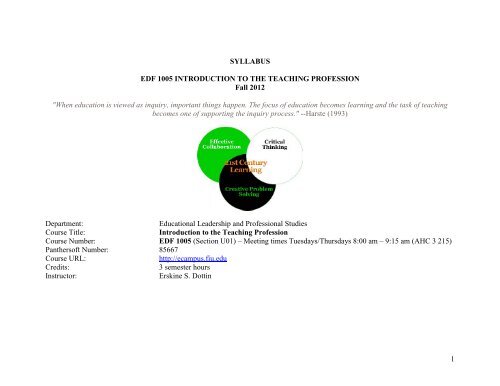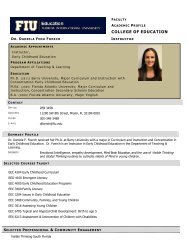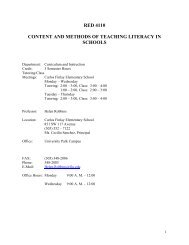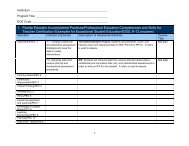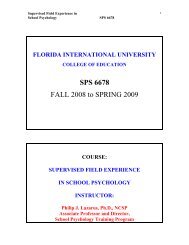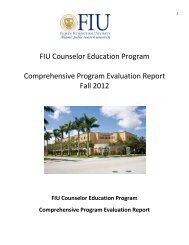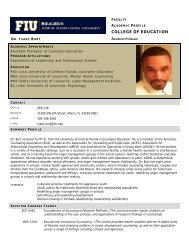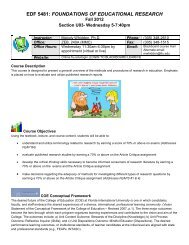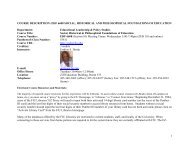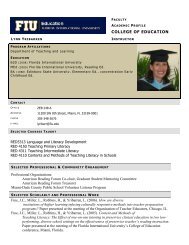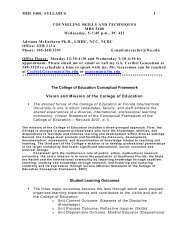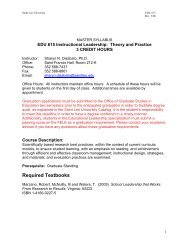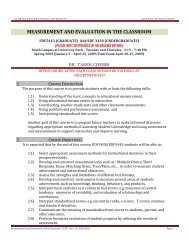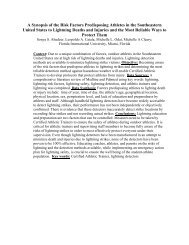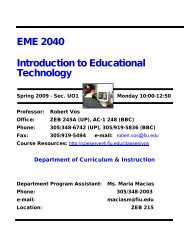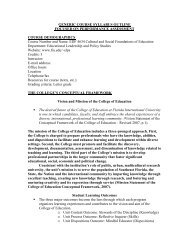course syllabus: edf 1005 introduction to education - College of ...
course syllabus: edf 1005 introduction to education - College of ...
course syllabus: edf 1005 introduction to education - College of ...
Create successful ePaper yourself
Turn your PDF publications into a flip-book with our unique Google optimized e-Paper software.
SYLLABUS<br />
EDF <strong>1005</strong> INTRODUCTION TO THE TEACHING PROFESSION<br />
Fall 2012<br />
"When <strong>education</strong> is viewed as inquiry, important things happen. The focus <strong>of</strong> <strong>education</strong> becomes learning and the task <strong>of</strong> teaching<br />
becomes one <strong>of</strong> supporting the inquiry process." --Harste (1993)<br />
Department:<br />
Educational Leadership and Pr<strong>of</strong>essional Studies<br />
Course Title:<br />
Introduction <strong>to</strong> the Teaching Pr<strong>of</strong>ession<br />
Course Number: EDF <strong>1005</strong> (Section U01) – Meeting times Tuesdays/Thursdays 8:00 am – 9:15 am (AHC 3 215)<br />
Panthers<strong>of</strong>t Number: 85667<br />
Course URL:<br />
http://ecampus.fiu.edu<br />
Credits:<br />
3 semester hours<br />
Instruc<strong>to</strong>r:<br />
Erskine S. Dottin<br />
1
E-Mail:<br />
dottine@fiu.edu<br />
Location: ZEB, Room 333<br />
Office Hours:<br />
Tuesdays (9:45 am - 12:15 pm) and Thursdays (9:45 am – 12:15 pm)<br />
Telephone:<br />
305-348-3462 (<strong>of</strong>fice) 305-234-8477 (home) Fax: 305-348-1515 (<strong>of</strong>fice) 305-234-8477 (home)<br />
Course Resources and Materials:<br />
Textbook<br />
Spring, J. (2006). 15 th Edition. American Education. Bos<strong>to</strong>n: McGraw-Hill.<br />
[Book S<strong>to</strong>re - http://fiu.bncollege.com/webapp/wcs/s<strong>to</strong>res/servlet/BNCBHomePages<strong>to</strong>reId=21551&catalogId=10001]<br />
Other books:<br />
Dottin, E.S. and Weiner, M. (2001). Enhancing effective thinking and problem solving for pre-service teacher <strong>education</strong> candidates<br />
and in-service pr<strong>of</strong>essionals. Lanham, MD: University Press <strong>of</strong> America. [Reserve Room Library]<br />
Other online resources: on BLACKBOARD LEARN http://ecampus.fiu.edu<br />
2
COURSE ASSESSMENT OF LEARNING TASKS AND EVALUATIVE PERCENTAGE WEIGHT (S)<br />
Case analysis - 60%<br />
Group performance - 30%<br />
Class Participation [including<br />
self knowledge quizzes, field - 10%<br />
reflective observation, class tasks/assignments]<br />
OVERALL GRADE CALCULATION [percentage x level <strong>of</strong> performance on task = overall 300 points. Grade percentage<br />
based on number <strong>of</strong> points out <strong>of</strong> 300]<br />
A=95-100%; A- =90-94%; B+=86-89%; B=85%; B- =80-84%; C+=76-79%; C=75%; C-=70-74%; D+=66-69%; D=65%;<br />
F=0-64%<br />
TASKSTREAM eFOLIO requirements for <strong>education</strong> majors<br />
The Taskstream eFolio system is the <strong>College</strong> <strong>of</strong> Education’s mechanism for documenting and tracking candidate learning and mastery <strong>of</strong> the<br />
<strong>College</strong> <strong>of</strong> Education’s Learning Outcomes (its Institutional Standards), the Florida Educa<strong>to</strong>r Accomplished Pr<strong>of</strong>essional Practices (FEAP’s),<br />
Florida’s standards for the teaching pr<strong>of</strong>ession, and the Interstate New Teacher Assessment Consortium Standards (INTASC) for<br />
pr<strong>of</strong>essional educa<strong>to</strong>rs. Candidates must create artifacts from their <strong>course</strong>work for the Taskstream eFolio system. The artifact from this <strong>course</strong> is<br />
the Case Analysis Paper.<br />
This <strong>course</strong>, therefore, requires that you acquire a TaskStream account for uploading your critical assignment (your <strong>course</strong> artifact).<br />
You can purchase an account at http://www.taskstream.com. Once you have a TaskStream account you will need <strong>to</strong> self-enroll in an<br />
assessment program that houses this <strong>course</strong>. The passcode for this <strong>course</strong> this semester is EDF<strong>1005</strong>-U01FA12 [see Program Code<br />
for the respective semester at http://www.taskstream.com/main//chang28/COE_WEBSITE.html<br />
Please sign up for an account sometime after the first week <strong>of</strong> class. Your TaskStream account will be used in many FIU <strong>College</strong> <strong>of</strong><br />
Education <strong>course</strong>s. It also <strong>of</strong>fers you s<strong>to</strong>rage space and web folio development for your pr<strong>of</strong>essional use. Candidates will upload their<br />
completed artifact Case Analysis (filename: EDF <strong>1005</strong> case analysis) Meeting Standards (EDF <strong>1005</strong> Meeting Standards) and Field Log<br />
summary after rceiving permission from the <strong>course</strong> instruc<strong>to</strong>r. Your Taskstream account also <strong>of</strong>fers you s<strong>to</strong>rage space and web folio<br />
development for your pr<strong>of</strong>essional use. The <strong>College</strong> <strong>of</strong> Education’s website http://<strong>education</strong>.fiu.edu/taskstream provides detailed information and<br />
3
instructions regarding how <strong>to</strong> purchase a new account, enroll in<strong>to</strong> a program/<strong>course</strong>, upload your artifact, document your field hours, responses <strong>to</strong><br />
frequently asked questions, and COE workshop training schedules. For help, go <strong>to</strong>: Taskstream (800-311-5656) help@taskstream.com; COE<br />
Taskstream Website http://<strong>education</strong>.fiu.edu/taskstream ; COE IT Department, ZEB 269, 305-348-6305, coesupport@fiu.edu; COE Computer<br />
Lab, ZEB 165, 305-348-6134.<br />
Assessment Panel Reviews<br />
The artifacts you upload on<strong>to</strong> Taskstream may be reviewed by a Panel <strong>of</strong> Assessment Raters in the <strong>College</strong> <strong>to</strong> ensure fairness and<br />
consistency in the scoring <strong>of</strong> the critical assignments. These reviews are required for accreditation purposes. The students’<br />
assignments reviewed will have no identifying information so the raters will not know whose students’ work they are reviewing. All<br />
data aggregated will contain no personal identifying information <strong>to</strong> ensure confidentiality <strong>of</strong> students’ work.<br />
Academic Conduct<br />
Florida International University is a community dedicated <strong>to</strong> generating and imparting knowledge through excellent teaching and<br />
research, the rigorous and respectful exchange <strong>of</strong> ideas and community service. All students should respect the right <strong>of</strong> others <strong>to</strong> have<br />
an equitable opportunity <strong>to</strong> learn and honestly <strong>to</strong> demonstrate the quality <strong>of</strong> their learning. Therefore, all students are expected <strong>to</strong><br />
adhere <strong>to</strong> a standard <strong>of</strong> academic conduct, which demonstrates respect for themselves, their fellow students, and the <strong>education</strong>al<br />
mission <strong>of</strong> the University. All students are deemed by the University <strong>to</strong> understand that if they are found responsible for academic<br />
misconduct, they will be subject <strong>to</strong> the Academic Misconduct procedures and sanctions, as outlined in the Student Handbook.<br />
Misconduct includes: Cheating – The unauthorized use <strong>of</strong> books, notes, aids, electronic sources; or assistance from another person<br />
with respect <strong>to</strong> examinations, <strong>course</strong> assignments, field service reports, class recitations; or the unauthorized possession <strong>of</strong><br />
examination papers or <strong>course</strong> materials, whether originally authorized or not. Plagiarism – The use and appropriation <strong>of</strong> another’s<br />
work without any indication <strong>of</strong> the source and the representation <strong>of</strong> such work as the student’s own. Any student who fails <strong>to</strong> give<br />
credit for ideas, expressions or materials taken from another source, including internet sources, is responsible for plagiarism.<br />
4
“Education is a journey, not a destination. The map is not the journey.”<br />
1. PURPOSE OF COURSE<br />
The primary purpose <strong>of</strong> this lower division <strong>education</strong> <strong>course</strong> is <strong>to</strong> give you a means for testing yourself as a potential teacher and <strong>to</strong><br />
introduce you <strong>to</strong> world <strong>of</strong> classrooms and schools (an <strong>introduction</strong> <strong>to</strong> the teaching pr<strong>of</strong>ession). Planning for teaching involves much<br />
more than being admitted <strong>to</strong> a program <strong>of</strong> teacher <strong>education</strong>, passing the required number <strong>of</strong> <strong>course</strong>s for state licensing, and securing a<br />
teaching position upon graduation. A career in <strong>education</strong> is a phase <strong>of</strong> life planning that involves fundamental values <strong>of</strong> life and is<br />
integrally related <strong>to</strong> an understanding <strong>of</strong> the relationship between schools and society (the his<strong>to</strong>rical, sociological and philosophical<br />
foundations <strong>of</strong> <strong>education</strong>), and <strong>of</strong> the major issues facing America's schools with regard <strong>to</strong> governance and finance <strong>of</strong> <strong>education</strong>,<br />
<strong>education</strong>al policies, legal, moral and ethical issues, and the pr<strong>of</strong>essionalism <strong>of</strong> teaching (e.g., Be able <strong>to</strong> identify current and his<strong>to</strong>rical<br />
trends, issues, and individuals who have influenced school curricula and the development <strong>of</strong> the school system in the United States; Research and discuss<br />
characteristics <strong>of</strong> effective schools; Compare and contrast various governance structures and identify the laws and crucial court cases that influence <strong>education</strong><br />
practices and programs; Assess the relationship between key <strong>education</strong>al philosophies and the development <strong>of</strong> <strong>education</strong>al practices in the United States;<br />
Recognize the economic issues that affect schools including sources <strong>of</strong> funding, funding formulae, school choice initiatives, tuition tax credit and vouchers;<br />
Research and discuss the legal and civil rights and responsibilities <strong>of</strong> students and teachers; Examine and discuss the attributes and ethical standards <strong>of</strong> a<br />
pr<strong>of</strong>essional educa<strong>to</strong>r; Describe the responses that schools use in addressing social issues that affect the learner in <strong>to</strong>day’s society; Describe how multiculturalism<br />
impacts schools and learners; and Research and identify career options in <strong>education</strong>).<br />
The <strong>education</strong>al aim in EDF <strong>1005</strong> is, therefore, <strong>to</strong> engender a meaningful <strong>education</strong>al experience for you, a beginning teacher<br />
<strong>education</strong> candidate, through the examination <strong>of</strong> cases that “…are controversial in nature and challenge you, a beginning teacher<br />
educa<strong>to</strong>r, <strong>to</strong> think analytically and thoughtfully about the experiences the case describes. It is anticipated that the experience will<br />
enable you, a beginning candidate, <strong>to</strong> grow by deepening and broadening yourself as you work in a learning community, pursuing<br />
social ends (the solving <strong>of</strong> a case/case analysis), using knowledge <strong>of</strong> school and society (the his<strong>to</strong>rical, sociological and philosophical<br />
foundations <strong>of</strong> <strong>education</strong>), and power and control in American <strong>education</strong> (governance and finance, <strong>education</strong>al policies, legal issues,<br />
and pr<strong>of</strong>essionalism <strong>of</strong> teaching), and requisite thinking skills.<br />
It is assumed that educative environments induce certain kinds <strong>of</strong> intellectual, emotional and social dispositions (habits <strong>of</strong> mind), and<br />
as such these habits <strong>of</strong> mind (dispositions) will be manifested in the class sessions, <strong>course</strong> tasks, and learning communities. The class<br />
is, therefore, structured so that you (the candidate) work in a learning community on a genuine classroom case, use general<br />
pedagogical knowledge, and the curriculum <strong>of</strong> (social foundations <strong>of</strong> <strong>education</strong>) <strong>to</strong> investigate and discover solutions <strong>to</strong> these<br />
5
problems, and as a result, establish connections with the <strong>course</strong> subject matter. Each learning community, therefore, will use a<br />
case analysis process <strong>to</strong> study and resolve the case by employing the ideas, the logic, the methods, and the materials <strong>of</strong> the<br />
social foundations <strong>of</strong> <strong>education</strong> curriculum.<br />
The basic pedagogical assumption in the <strong>course</strong> is that talking with others can yield meaning, knowledge and wisdom and can form<br />
requisite dispositions (habits <strong>of</strong> mind) <strong>of</strong> moral sensibility. Consequently, the <strong>course</strong> will provide the initial catalyst for you <strong>to</strong><br />
consider the question, “what does it mean <strong>to</strong> be able <strong>to</strong> move from novice <strong>to</strong> expert in problem solving in classroom teaching<br />
and learning from the perspective <strong>of</strong> a beginning pr<strong>of</strong>essional” In addition, the <strong>course</strong> will provide you an opportunity <strong>to</strong><br />
observe, reflect and interpret teachers and students problem solving behaviors in classroom settings as a result <strong>of</strong> your 15-<br />
hour field experience in classroom settings.<br />
2. COLLEGE OF EDUCATION CONCEPTUAL FRAMEWORK/CANDIDATE [STUDENT] LEARNING OUTCOMES<br />
The conceptual focus <strong>of</strong> the <strong>course</strong>, therefore, is congruent with the unit’s Conceptual Framework, in particular, its vision <strong>of</strong> a desired<br />
future in which an emphasis is on inquiry as the means-ends connection <strong>to</strong> enhance reflective intelligence, and its philosophy that<br />
promotes the kind <strong>of</strong> wisdom in practice that elicits the mental and moral sensibilities consistent with reflective intelligence, and as<br />
such enhances the candidate’s pr<strong>of</strong>essional conduct being more intelligent. The <strong>course</strong> enables candidates <strong>to</strong> achieve the following<br />
unit’s (<strong>College</strong> <strong>of</strong> Education’s) learning outcomes (by involving them in an orientation <strong>to</strong> the <strong>education</strong> system as they engage in<br />
problem-based learning, through case analysis, from the perspective <strong>of</strong> a beginning pr<strong>of</strong>essional):<br />
Steward <strong>of</strong> the Discipline<br />
Candidates know their content and engage in cross-disciplinary activities <strong>to</strong> ensure breadth and depth <strong>of</strong> knowledge.<br />
Reflective Inquirer<br />
Candidates think critically about issues through a form <strong>of</strong> inquiry that investigates dilemmas and problems and seek resolutions that<br />
benefit all involved.<br />
Candidates reflect on practice and change approaches based on own insights.<br />
Candidates reflect on practice with the goal <strong>of</strong> continuous improvement.<br />
Mindful Educa<strong>to</strong>r<br />
Candidates demonstrate the habits <strong>of</strong> mind <strong>of</strong> being analytical; managing impulsivity; persisting; thinking about own thinking;<br />
communicating accurately; being inquisitive; taking responsible risks; being open-minded; striving for accuracy; applying past<br />
knowledge <strong>to</strong> new situations; thinking interdependently; and showing a sense <strong>of</strong> care for others.<br />
6
3. COURSE LEARNING OUTCOMES<br />
The specific learning outcomes for the <strong>course</strong> are congruent with the guidelines for <strong>course</strong>s in foundations <strong>of</strong> <strong>education</strong> as<br />
disseminated by the Council for Social Foundations <strong>of</strong> Education (CSFE) http://www.uic.edu/educ/csfe/index.htm and the Florida<br />
Department <strong>of</strong> Education . As a result, at the end <strong>of</strong> the <strong>course</strong>, candidates should have acquired the following understandings, skills,<br />
and dispositions/habits <strong>of</strong> mind:<br />
1. Understand and can apply knowledge from the social foundations <strong>to</strong> interpreting the meanings <strong>of</strong> <strong>education</strong> and schooling in<br />
diverse cultural contexts. [Knows content and engages in cross-disciplinary activities <strong>to</strong> ensure breadth and depth <strong>of</strong> knowledge].<br />
(his<strong>to</strong>rical knowledge- current and his<strong>to</strong>rical trends, issues, and individuals who have influenced school curricula and the development <strong>of</strong> the school system in<br />
the United States, philosophical knowledge- Assess the relationship between key <strong>education</strong>al philosophies and the development <strong>of</strong> <strong>education</strong>al practices in the<br />
United States, legal, ethical and policy knowledge- Research and discuss the legal and civil rights and responsibilities <strong>of</strong> students and teachers; Compare and<br />
contrast various governance structures and identify the laws and crucial court cases that influence <strong>education</strong> practices and programs; Examine and discuss the<br />
attributes and ethical standards <strong>of</strong> a pr<strong>of</strong>essional educa<strong>to</strong>r, school finance- Recognize the economic issues that affect schools including sources <strong>of</strong> funding,<br />
funding formulae, school choice initiatives, tuition tax credit and vouchers, social and cultural knowledge- Describe the responses that schools use in addressing<br />
social issues that affect the learner in <strong>to</strong>day’s society; Describe how multiculturalism impacts schools and learners, knowledge <strong>of</strong> effective schools- Research and<br />
discuss characteristics <strong>of</strong> effective schools; and pr<strong>of</strong>essionalism- career- Research and identify career options in <strong>education</strong>.<br />
2. Understand and can apply critical perspectives on <strong>education</strong> and schooling by thinking critically about <strong>education</strong>al issues through a<br />
form <strong>of</strong> inquiry that investigates dilemmas and problems and seeks resolutions that benefit all involved [Reflects on practice and changes<br />
approaches based on own insights; and reflects on practice with the goal <strong>of</strong> continuous improvement].<br />
3. Be disposed <strong>to</strong> intellectual and emotional habits <strong>of</strong> mind [Being analytical; managing impulsivity; persisting; thinking about own thinking;<br />
communicating accurately; being inquisitive; taking responsible risks; being open-minded; striving for accuracy; applying past knowledge <strong>to</strong> new<br />
situations; thinking interdependently; showing a sense <strong>of</strong> care for others].<br />
7
4. CURRICULAR DESIGN/ DESIRED RESULTS, ASSESSMENT METHODS, and LEARNING EXPERIENCES<br />
UNIT OF STUDY DESIGN<br />
Essential Question<br />
“What does it mean <strong>to</strong> be able <strong>to</strong> move from novice <strong>to</strong> expert in problem solving in classroom teaching and learning from the<br />
perspective <strong>of</strong> a beginning pr<strong>of</strong>essional”<br />
Performance Task<br />
THE PERFORMANCE TASK AND ARTIFACT<br />
ARTIFACT as evidence <strong>of</strong> learning<br />
Case Analysis<br />
Candidates in learning communities will engage in a case analysis in which they<br />
(1) place the problem in definitional category (2) identify the things known (the<br />
facts in the case) (3) identify things not known but relevant <strong>to</strong> the case – questions<br />
and <strong>to</strong>pics (4) draw on theoretical, empirical and craft knowledge <strong>to</strong> help support<br />
claims <strong>of</strong> the <strong>to</strong>pics/fac<strong>to</strong>rs’ related importance (5) identify underlying arguments<br />
in the case – implicit and explicit – and check their validity (6) identify things<br />
taken for granted in the case – implicitly and explicitly (7) <strong>of</strong>fer an interpretation<br />
<strong>of</strong> and solution(s) for the problem by <strong>of</strong>fering interpretations <strong>of</strong> the significant<br />
issues, noting weaknesses in reasoning they want <strong>to</strong> avoid, and assumptions not<br />
accepted, and providing solutions supported by pr<strong>of</strong>essional knowledge.<br />
The task assumes that by pursuing social ends (a case analysis), using content<br />
knowledge and thinking skills, certain intellectual, emotional, and social<br />
dispositions will be formed (moral sensibilities/dispositions or habits <strong>of</strong> mind<br />
that make pr<strong>of</strong>essional action more intelligent and thus more ethical).<br />
Product Components (how it must be presented)<br />
The components <strong>of</strong> the project should be as follows: 1. A cover page. 2. An<br />
outline <strong>of</strong> case narrative. 3. Problem Defined – an explanation <strong>of</strong> the<br />
problem. 4. Facts in the Case – an identification <strong>of</strong> the things known in the<br />
case. 5. Related Fac<strong>to</strong>rs and Topics – a description <strong>of</strong> the things not known<br />
but are important in understanding the nuances <strong>of</strong> the case (questions and<br />
<strong>to</strong>pics). .6. Arguments – the description <strong>of</strong> arguments, both implicit and<br />
explicit in the case and an analysis <strong>of</strong> these arguments. 7. Assumptions –<br />
the identification <strong>of</strong> things taken for granted in the case (explicitly and<br />
implicitly). 8. Knowledge Background on Topics – an explanation <strong>of</strong> what<br />
is known about each <strong>to</strong>pic. 9. Interpretation and Solutions – a descriptive<br />
and analytical interpretation <strong>of</strong> the case and relevant solutions supported by<br />
a pr<strong>of</strong>essional knowledge base (part <strong>of</strong> this knowledge base will be<br />
acquired by a 15 hours field experience in a school setting). 10. A meeting<br />
standards template in which artifact learning (understandings, skills, and<br />
dispositions) are linked <strong>to</strong> institutional, state, and pr<strong>of</strong>essional standards<br />
(Criteria for assessing performance levels)<br />
Understanding the nature <strong>of</strong> the problem<br />
Application <strong>of</strong> ideas from the <strong>course</strong> content and/or relevant <strong>education</strong>al knowledge base(s)<br />
Reasoning skills and support for claims<br />
Use <strong>of</strong> theoretical principles, principles <strong>of</strong> practice, etc. (the use <strong>of</strong> context/situational knowledge<br />
Options/solutions generated<br />
8
References that meet APA Reference Style requirements<br />
Writing skills in case analysis paper<br />
Performance criteria<br />
Understanding the nature<br />
<strong>of</strong> the problem<br />
Application <strong>of</strong> ideas from<br />
the <strong>course</strong> content and/or<br />
relevant <strong>education</strong>al<br />
knowledge base(s)<br />
Related COE<br />
Outcome(s)<br />
Think critically<br />
about issues<br />
through a form<br />
<strong>of</strong> inquiry that<br />
investigates<br />
dilemmas and<br />
problems and<br />
seek resolutions<br />
that benefit<br />
students. [RI 3]<br />
Know their<br />
content and<br />
engage in crossdisciplinary<br />
activities <strong>to</strong><br />
ensure breadth<br />
and depth <strong>of</strong><br />
knowledge.<br />
[SD1 SD3]<br />
Think critically<br />
about issues<br />
through a form<br />
<strong>of</strong> inquiry that<br />
investigates<br />
dilemmas and<br />
problems and<br />
seek resolutions<br />
that benefit<br />
RUBRIC FOR ASSESSING ARTIFACT<br />
Related habit <strong>of</strong><br />
mind<br />
Being analytical<br />
- Questioning<br />
and Posing<br />
problems<br />
Persisting<br />
Being<br />
inquisitive<br />
Target/outstanding<br />
(3)<br />
Shows outstanding<br />
evidence <strong>of</strong><br />
understanding the<br />
nature <strong>of</strong> the problem<br />
by being analytical in<br />
separating the problem<br />
from its symp<strong>to</strong>ms,<br />
facts from opinions,<br />
identifying major<br />
unanswered questions<br />
and underlying<br />
<strong>education</strong>al issues.<br />
Shows outstanding<br />
evidence <strong>of</strong><br />
systematically working<br />
<strong>to</strong> broaden the<br />
knowledge base for the<br />
problem; goes after<br />
material on own<br />
initiative.<br />
Acceptable/adequate<br />
(2)<br />
Shows adequate evidence <strong>of</strong><br />
understanding the nature <strong>of</strong><br />
the problem by being<br />
analytical in separating the<br />
problem from its symp<strong>to</strong>ms,<br />
facts from opinions,<br />
identifying major unanswered<br />
questions and underlying<br />
<strong>education</strong>al issues. FEAP-1.<br />
a.3.f employ higher-order<br />
questioning techniques<br />
Critical Thinking/PEC4<br />
Shows adequate evidence <strong>of</strong><br />
systematically working <strong>to</strong><br />
broaden the knowledge base<br />
for the problem (his<strong>to</strong>rical,<br />
sociological, philosophical,<br />
legal, ethical, policies, and<br />
pr<strong>of</strong>essionalism); goes after<br />
material with some<br />
direction. FEAP- 1. a.2.f<br />
maintains a climate <strong>of</strong> openness,<br />
inquiry, fairness and support;<br />
FEAP 1. a.3.e relate and integrate<br />
subject matter with other<br />
disciplines and life experiences ;<br />
FEAP – 1. b.1.c collaborates with<br />
the home, school and larger<br />
communities <strong>to</strong> foster<br />
communication and <strong>to</strong> support<br />
student learning and continuous<br />
improvement; FEAP – 1. b.1.e<br />
Unacceptable/inadequate<br />
(1)<br />
Shows little evidence <strong>of</strong><br />
understanding the nature <strong>of</strong><br />
the problem by being<br />
analytical in separating the<br />
problem from its symp<strong>to</strong>ms,<br />
facts from opinions,<br />
identifying major unanswered<br />
questions and underlying<br />
<strong>education</strong>al issues.<br />
Shows limited evidence <strong>of</strong><br />
systematically working <strong>to</strong><br />
broaden the knowledge base<br />
for the problem; goes after<br />
material in a very limited<br />
manner.<br />
9
students. [RI 3]<br />
engages in targeted pr<strong>of</strong>essional<br />
growth opportunities and reflective<br />
practices both independently and in<br />
collaboration with colleagues;<br />
FAEP – 1. b.2 adheres <strong>to</strong> Code <strong>of</strong><br />
Ethics and the Principles <strong>of</strong><br />
Pr<strong>of</strong>essional Conduct<br />
Reasoning skills and<br />
support for claims<br />
Use <strong>of</strong> theoretical<br />
principles, principles <strong>of</strong><br />
practice, etc. (the use <strong>of</strong><br />
context/situational<br />
knowledge<br />
Interpretations/solutions<br />
generated<br />
Reflect on<br />
practice and<br />
change<br />
approaches<br />
based on own<br />
insights. [RI 1]<br />
Reflect on<br />
practice with the<br />
goal <strong>of</strong><br />
continuous<br />
improvement.<br />
[RI 2]<br />
Engage in crossdisciplinary<br />
activities <strong>to</strong><br />
ensure breadth<br />
and depth <strong>of</strong><br />
knowledge.<br />
[SD3]<br />
Reflect on<br />
practice with the<br />
goal <strong>of</strong><br />
continuous<br />
Thinking about<br />
own thinking<br />
Managing<br />
impulsivity<br />
Thinking<br />
Flexibly<br />
shows outstanding<br />
evidence <strong>of</strong><br />
thinking about own<br />
thinking through the use<br />
<strong>of</strong> reasoning skills <strong>to</strong><br />
identify and analyze<br />
arguments and things<br />
taken for granted<br />
Shows outstanding<br />
evidence <strong>of</strong><br />
deliberateness in being<br />
thoughtful in the use <strong>of</strong><br />
theoretical principles<br />
and principles <strong>of</strong><br />
practice <strong>to</strong> interpret<br />
problems<br />
Shows outstanding<br />
evidence <strong>of</strong> being open<br />
<strong>to</strong> change by seeing<br />
things from different<br />
Continuous Improvement/PEC3<br />
Critical Thinking/PEC4<br />
Diversity/PEC5<br />
Ethics/PEC6<br />
PEC 13/Foundations <strong>of</strong> Education<br />
PEC14/ESOL<br />
Shows adequate evidence <strong>of</strong><br />
thinking about own thinking<br />
through the use <strong>of</strong> reasoning<br />
skills <strong>to</strong> identify and analyze<br />
arguments and things taken<br />
for granted. FEAP- 1. b.1.e<br />
Engages in reflective practices<br />
independently and in collaboration<br />
with colleagues<br />
Commmunication/PEC2<br />
Critical Thinking/PEC4<br />
Shows adequate evidence <strong>of</strong><br />
deliberateness in being<br />
thoughtful in the use <strong>of</strong><br />
theoretical principles and<br />
principles <strong>of</strong> practice <strong>to</strong><br />
interpret problems. FEAP – 1.<br />
a.3.e relate and integrate subject<br />
matter with other disciplines and<br />
life experiences<br />
PEC13/Foundations <strong>of</strong> Education<br />
Shows adequate evidence <strong>of</strong><br />
being open <strong>to</strong> change by<br />
seeing things from different<br />
perspectives in the options<br />
shows limited evidence <strong>of</strong><br />
thinking about own thinking<br />
through the use <strong>of</strong> reasoning<br />
skills <strong>to</strong> identify and analyze<br />
arguments and things taken<br />
for granted<br />
Shows limited evidence <strong>of</strong><br />
deliberateness in being<br />
thoughtful in the use <strong>of</strong><br />
theoretical principles and<br />
principles <strong>of</strong> practice <strong>to</strong><br />
interpret problems<br />
Shows limited evidence <strong>of</strong><br />
being open <strong>to</strong> change by<br />
seeing things from different<br />
perspectives in the options<br />
10
References that meet<br />
APA Reference Style<br />
requirements<br />
Writing skills in case<br />
analysis paper<br />
improvement.<br />
[RI 2]<br />
Think critically<br />
about issues<br />
through a form<br />
<strong>of</strong> inquiry that<br />
investigates<br />
dilemmas and<br />
problems and<br />
seek resolutions<br />
that benefit<br />
students. [RI 3]<br />
Think critically<br />
about issues<br />
through a form<br />
<strong>of</strong> inquiry that<br />
investigates<br />
dilemmas and<br />
problems and<br />
seek resolutions<br />
that benefit<br />
students. [RI 3]<br />
Striving for<br />
accuracy<br />
Thinking and<br />
communicating<br />
with clarity and<br />
precision<br />
perspectives in the<br />
options and solutions<br />
generated for problems.<br />
Shows outstanding<br />
evidence <strong>of</strong> striving for<br />
accuracy by providing a<br />
comprehensive<br />
bibliography <strong>of</strong> relevant<br />
sources and exactness<br />
in APA citations in the<br />
narrative and reference<br />
section<br />
Shows outstanding<br />
evidence <strong>of</strong> thinking<br />
and communicating<br />
with clarity and<br />
precision by exhibiting<br />
command <strong>of</strong> the<br />
language and correct<br />
use <strong>of</strong> grammar and<br />
syntax<br />
and solutions generated for<br />
problems. FEAP 1. a. 2.f. –<br />
maintains a climate <strong>of</strong> openness,<br />
inquiry, fairness and support<br />
Continuous Improvement/PEC3<br />
Critical Thinking/PEC4<br />
PEC13/Foundations <strong>of</strong> Education<br />
Shows adequate evidence <strong>of</strong><br />
striving for accuracy by<br />
providing a comprehensive<br />
bibliography <strong>of</strong> relevant<br />
sources and exactness in APA<br />
citations in the narrative and<br />
reference section. FEAP 1.<br />
a.2.e – Models clear, acceptable<br />
oral and written communication<br />
skills<br />
Continuous Improvement/PEC3<br />
Shows adequate evidence <strong>of</strong><br />
thinking and communicating<br />
with clarity and precision by<br />
exhibiting command <strong>of</strong> the<br />
language and correct use <strong>of</strong><br />
grammar and syntax.<br />
FEAP 1. a.2.e – Models clear,<br />
acceptable oral and written<br />
communication skills<br />
Communication/PEC2<br />
Continuous Improvement/PEC3<br />
and solutions generated for<br />
problems.<br />
Shows limited evidence <strong>of</strong><br />
striving for accuracy by<br />
providing a comprehensive<br />
bibliography <strong>of</strong> relevant<br />
sources and exactness in APA<br />
citations in the narrative and<br />
reference section<br />
Shows limited evidence <strong>of</strong><br />
thinking and communicating<br />
with clarity and precision by<br />
exhibiting command <strong>of</strong> the<br />
language and correct use <strong>of</strong><br />
grammar and syntax<br />
11
LEARNING EXPERIENCES/INSTRUCTION – Learning candidates must undergo and activities candidates will do during<br />
the <strong>education</strong>al journey that will evoke and develop the desired understandings, promote interest, and make excellent<br />
performance more likely<br />
Objective<br />
Content<br />
Concepts, facts, principles<br />
<strong>to</strong> comprehend<br />
Processes and Skills<br />
Procedures, processes <strong>to</strong><br />
master and demonstrate<br />
Habits <strong>of</strong> Mind<br />
Dispositions <strong>to</strong> make<br />
judgment more intelligent<br />
Assessment<br />
Learning Objective #1<br />
Given a case scenario by the<br />
instruc<strong>to</strong>r, the candidate will<br />
apply his/her knowledge <strong>of</strong><br />
separating a problem from its<br />
symp<strong>to</strong>ms and facts from<br />
opinions <strong>to</strong> identify the<br />
underlying problem and facts<br />
(things known directly) in the<br />
case.<br />
(analysis/application)<br />
Problem solving<br />
– purpose and errors<br />
– novice versus expert<br />
Skills <strong>of</strong> analysis (trouble<br />
shooting)<br />
Separating a problem from its<br />
symp<strong>to</strong>ms<br />
Separating fact from opinion<br />
Group process skills<br />
[1] Questioning and posing<br />
problems<br />
[11] Thinking<br />
interdependently<br />
[12] Listening and<br />
understanding with empathy<br />
and caring<br />
Assessment <strong>of</strong> understanding<br />
through oral questioning<br />
Assessment <strong>of</strong> skills through<br />
performance assessments,<br />
observations and checklists<br />
Assessment <strong>of</strong> habits <strong>of</strong> mind<br />
through checklist and habits<br />
<strong>of</strong> mind inven<strong>to</strong>ry reflection<br />
Objective Content Processes and Skills Habits <strong>of</strong> Mind/Dispositions Assessment<br />
The art <strong>of</strong> investigation Asking proper questions as in [1] Questioning and posing<br />
the art <strong>of</strong> investigation problems – being analytical<br />
Objective #2<br />
Given a case scenario by the<br />
instruc<strong>to</strong>r, the candidate will<br />
demonstrate his/her<br />
comprehension <strong>of</strong> the case by<br />
identifying things not known<br />
directly, and his/her<br />
pr<strong>of</strong>essional knowledge base<br />
by stating the relevance <strong>of</strong> the<br />
things not known <strong>to</strong> the case,<br />
and by identifying <strong>to</strong>pics <strong>to</strong><br />
be studied for further<br />
understanding <strong>of</strong> the problem<br />
Applying previous<br />
knowledge <strong>to</strong> new situation<br />
Group process skills<br />
[8] Applying past knowledge<br />
<strong>to</strong> new situations<br />
[11] Thinking<br />
interdependently<br />
Assessment <strong>of</strong> understanding<br />
through oral questioning<br />
Assessment <strong>of</strong> skills through<br />
performance assessments,<br />
observations and checklists<br />
Assessment <strong>of</strong> habits <strong>of</strong> mind<br />
through checklist and habits<br />
<strong>of</strong> mind inven<strong>to</strong>ry reflection<br />
12
in the case<br />
(questions/relevance and<br />
<strong>to</strong>pics)<br />
(knowledge/comprehension)<br />
Objective Content Processes and Skills Habits <strong>of</strong> Mind Assessment<br />
Learning Objective #3 Know kinds <strong>of</strong> arguments Be able <strong>to</strong> identify and [2] Thinking flexibly<br />
Know forms <strong>of</strong> arguments analyze arguments and<br />
Know valid from invalid assumptions<br />
5] Thinking about own<br />
forms <strong>of</strong> arguments<br />
thinking<br />
After presentations by the<br />
instruc<strong>to</strong>r on arguments and<br />
assumptions, candidates in<br />
learning communities will<br />
apply their understanding <strong>of</strong><br />
arguments and assumptions <strong>to</strong><br />
identify arguments and<br />
assumptions in the case and<br />
state their validity.<br />
(application)<br />
Be able <strong>to</strong> check the validity<br />
<strong>of</strong> argument and assumptions<br />
Demonstrate group process<br />
skills - managerial<br />
(mechanisms by which<br />
community acts as a unit and<br />
not as a loose rabble) and<br />
interpersonal (basic manners)<br />
[11] Thinking<br />
interdependently<br />
[12] Listening with<br />
understanding and empathy<br />
Assessment <strong>of</strong> understanding<br />
through matching exercises<br />
Assessment <strong>of</strong> skills through<br />
observations and checklists<br />
Assessment <strong>of</strong> habits <strong>of</strong> mind<br />
through checklist and habits<br />
<strong>of</strong> mind inven<strong>to</strong>ry reflection<br />
Objective Content Processes and Skills Habits <strong>of</strong> Mind Assessment<br />
Learning Objective #4 Know the structure for Be able <strong>to</strong> conduct a literature [3] Managing impulsivity<br />
writing a literature review review using varied formats.<br />
After a presentation on<br />
literature review by the<br />
instruc<strong>to</strong>r, and participating<br />
in an information literacy and<br />
research strategies session<br />
with a Reference Librarian,<br />
candidates in their learning<br />
Know basic APA citation<br />
requirements<br />
Search strategy techniques –<br />
Know about keywords,<br />
synonyms, Boolean,<br />
Be able <strong>to</strong> write a literature<br />
review using APA.<br />
Group process skills<br />
[4] Persisting<br />
[6] Striving for accuracy<br />
(exactness and correctness)<br />
[7] Thinking and<br />
communicating with clarity<br />
Assessment <strong>of</strong> understanding<br />
through Pre- Post- Search<br />
Strategy Quiz<br />
Assessment <strong>of</strong> skills through<br />
performance assessment<br />
Assessment <strong>of</strong> habits <strong>of</strong> mind<br />
through checklist and habits<br />
13
communities will use<br />
research information<br />
effectively <strong>to</strong> write a<br />
literature review <strong>of</strong> key <strong>to</strong>pics<br />
in the case.<br />
(application)<br />
truncation, adjacency, subject<br />
headings/descrip<strong>to</strong>rs<br />
Know about relevant<br />
databases<br />
Know about search <strong>to</strong>ols<br />
Know about criteria <strong>to</strong><br />
evaluate quality <strong>of</strong> web<br />
resources<br />
Know if library owns<br />
something<br />
and precision<br />
[9] Responding with<br />
wonderment and awe<br />
<strong>of</strong> mind inven<strong>to</strong>ry reflection<br />
Objective Content Processes and Skills Habits <strong>of</strong> Mind/Dispositions Assessment<br />
Objective #5<br />
Using chapters in an assigned<br />
textbook, candidates will<br />
engage in focus discussions<br />
and demonstrate recall <strong>of</strong> the<br />
content and use any <strong>of</strong> the<br />
content that may be relevant<br />
for the literature review on<br />
the <strong>to</strong>pics in the case.<br />
(knowledge, application)<br />
Know about:<br />
Goals <strong>of</strong> public schooling;<br />
Education and equality <strong>of</strong><br />
opportunity; race, gender and<br />
special needs.<br />
Student diversity and<br />
multicultural and multilingual<br />
<strong>education</strong>; The control <strong>of</strong><br />
<strong>education</strong>: local, state and<br />
federal; The pr<strong>of</strong>ession <strong>of</strong><br />
teaching; globalization <strong>of</strong><br />
<strong>education</strong><br />
Show application by using<br />
information <strong>to</strong> complete a<br />
literature review on a <strong>to</strong>pic.<br />
Demonstrate group process<br />
skills<br />
[3] Managing impulsivity<br />
[4] Persisting<br />
[6] Striving for accuracy<br />
[7] Thinking and<br />
communicating with clarity<br />
and precision<br />
[9] Responding with<br />
wonderment and awe<br />
Assessment <strong>of</strong> understanding<br />
through multiple choice quiz<br />
Assessment <strong>of</strong> skills through<br />
performance assessment<br />
Assessment <strong>of</strong> habits <strong>of</strong> mind<br />
through checklist and habits<br />
<strong>of</strong> mind inven<strong>to</strong>ry reflection<br />
Objective Content Processes and Skills Habits <strong>of</strong> Mind/Dispositions Assessment<br />
Objective #6<br />
Pr<strong>of</strong>essional knowledge from<br />
[2] Thinking flexibly<br />
literature review<br />
After being given a working<br />
prompt by the instruc<strong>to</strong>r,<br />
candidates in learning<br />
communities will formulate a<br />
written interpretation <strong>of</strong>, and<br />
Be able <strong>to</strong> use pr<strong>of</strong>essional<br />
literature <strong>to</strong> justifying<br />
interpretation(s)<br />
Demonstrate group process<br />
skills<br />
[3] Managing impulsivity<br />
[8] Applying past knowledge<br />
<strong>to</strong> new situations – transfer<br />
knowledge<br />
Assessment <strong>of</strong> understanding<br />
through constructed response<br />
questions<br />
Assessment <strong>of</strong> skills through<br />
performance assessment<br />
14
solutions for the problem in<br />
the case.<br />
(synthesis)<br />
[10] Taking responsible risks<br />
[11] Thinking<br />
interdependently<br />
[12] Listening and<br />
understanding with empathy<br />
Assessment <strong>of</strong> habits <strong>of</strong> mind<br />
through checklist and habits<br />
<strong>of</strong> mind inven<strong>to</strong>ry reflection<br />
15
LEARNING OBJECTIVES ALIGNED WITH Institutional, State, and Pr<strong>of</strong>essional Standards<br />
Learning Objectives in Course Institutional Standards State Standards Pr<strong>of</strong>essional<br />
Standards<br />
Learning Objective #1<br />
Given a case scenario by the instruc<strong>to</strong>r, the<br />
candidate will apply his/her knowledge <strong>of</strong><br />
separating a problem from its symp<strong>to</strong>ms and<br />
facts from opinions <strong>to</strong> identify the underlying<br />
problem and facts (things known directly) in<br />
the case.<br />
(application)<br />
Institutional Standards:<br />
<strong>College</strong> <strong>of</strong> Education<br />
Reflective Inquirer<br />
Reflect on practice and change<br />
approaches based on own<br />
insights.<br />
Reflect on practice with the<br />
goal <strong>of</strong> continuous<br />
improvement.<br />
Think critically about issues<br />
through a form <strong>of</strong> inquiry that<br />
investigates dilemmas and<br />
problems and seek resolutions<br />
that benefit all involved.<br />
Mindful Educa<strong>to</strong>r<br />
Being analytical; managing<br />
impulsivity; persisting;<br />
thinking about own thinking;<br />
communicating accurately;<br />
being inquisitive; taking<br />
responsible risks; being openminded;<br />
striving for accuracy;<br />
applying past knowledge <strong>to</strong><br />
new situations; thinking<br />
interdependently; showing a<br />
sense <strong>of</strong> care for others.<br />
State Standards: Florida Educa<strong>to</strong>r<br />
Accomplished Practices –<br />
Practice: Quality <strong>of</strong> Instruction/Instructional<br />
Delivery and Facilitation – The pre-pr<strong>of</strong>essional<br />
educa<strong>to</strong>r employs higher-order questioning techniques<br />
Pr<strong>of</strong>essional Education Competencies<br />
PEC4/Critical Thinking – The pre-pr<strong>of</strong>essional<br />
educa<strong>to</strong>r has knowledge <strong>of</strong> strategies that will promote<br />
and enhance critical thinking<br />
National Standards:<br />
INTASC (Interstate New<br />
Teacher Assessment and<br />
Support Consortium)<br />
INTASC Standard 5:<br />
Application <strong>of</strong> Content<br />
5(m) -The pre-pr<strong>of</strong>essional<br />
educa<strong>to</strong>r understands critical<br />
thinking processes and<br />
knows how <strong>to</strong> help learners<br />
develop high level<br />
questioning skills <strong>to</strong> promote<br />
their independent learning.<br />
5(q) – The pre-pr<strong>of</strong>essional<br />
educa<strong>to</strong>r is constantly<br />
exploring how <strong>to</strong> use<br />
disciplinary knowledge as a<br />
lens <strong>to</strong> address local and<br />
global issues.<br />
INTASC Standard 10:<br />
Leadership and<br />
Collaboration<br />
10(f) – The pre-pr<strong>of</strong>essional<br />
educa<strong>to</strong>r engages in<br />
pr<strong>of</strong>essional learning,<br />
contributes <strong>to</strong> the knowledge<br />
and skills <strong>of</strong> others, and<br />
works collaboratively <strong>to</strong><br />
advance pr<strong>of</strong>essional<br />
practice.<br />
Objective #2 Reflective Inquirer Practice: Quality <strong>of</strong> INTASC Standard 5:<br />
16
Given a case scenario by the instruc<strong>to</strong>r, the<br />
candidate will demonstrate his/her<br />
comprehension by identifying things not<br />
known directly, by stating their relevance <strong>to</strong><br />
the case, and by identifying <strong>to</strong>pics <strong>to</strong> be<br />
studied for further understanding <strong>of</strong> the<br />
problem in the case (questions/relevance and<br />
<strong>to</strong>pics)<br />
(knowledge/comprehension)<br />
Reflect on practice and change<br />
approaches based on own<br />
insights.<br />
Reflect on practice with the<br />
goal <strong>of</strong> continuous<br />
improvement.<br />
Think critically about issues<br />
through a form <strong>of</strong> inquiry that<br />
investigates dilemmas and<br />
problems and seek resolutions<br />
that benefit all involved.<br />
Mindful Educa<strong>to</strong>r<br />
Being analytical; managing<br />
impulsivity; persisting;<br />
thinking about own thinking;<br />
communicating accurately;<br />
being inquisitive; taking<br />
responsible risks; being openminded;<br />
striving for accuracy;<br />
applying past knowledge <strong>to</strong><br />
new situations; thinking<br />
interdependently; showing a<br />
sense <strong>of</strong> care for others.<br />
Instruction/Instructional Delivery and<br />
Facilitation – The pre-pr<strong>of</strong>essional teacher<br />
relates and integrates the subject matter with<br />
other disciplines and life experiences<br />
Pr<strong>of</strong>essional Education Competencies<br />
PEC4/Critical Thinking – The prepr<strong>of</strong>essional<br />
educa<strong>to</strong>r has knowledge <strong>of</strong><br />
strategies that will promote and enhance<br />
critical thinking<br />
Application <strong>of</strong> Content<br />
5(m) -The pre-pr<strong>of</strong>essional<br />
educa<strong>to</strong>r understands critical<br />
thinking processes and<br />
knows how <strong>to</strong> help learners<br />
develop high level<br />
questioning skills <strong>to</strong> promote<br />
their independent learning.<br />
5(q) – The pre-pr<strong>of</strong>essional<br />
educa<strong>to</strong>r is constantly<br />
exploring how <strong>to</strong> use<br />
disciplinary knowledge as a<br />
lens <strong>to</strong> address local and<br />
global issues.<br />
INTASC Standard 10:<br />
Leadership and<br />
Collaboration<br />
10(f) – The pre-pr<strong>of</strong>essional<br />
educa<strong>to</strong>r engages in<br />
pr<strong>of</strong>essional learning,<br />
contributes <strong>to</strong> the knowledge<br />
and skills <strong>of</strong> others, and<br />
works collaboratively <strong>to</strong><br />
advance pr<strong>of</strong>essional<br />
practice.<br />
Objective #3<br />
After presentations by the instruc<strong>to</strong>r on<br />
arguments and assumptions, candidates in<br />
learning communities will apply their<br />
understanding <strong>of</strong> arguments and assumptions<br />
<strong>to</strong> identify arguments and assumptions in the<br />
case and state their validity.<br />
(application)<br />
Reflective Inquirer<br />
Reflect on practice and change<br />
approaches based on own<br />
insights.<br />
Reflect on practice with the<br />
goal <strong>of</strong> continuous<br />
improvement.<br />
Think critically about issues<br />
through a form <strong>of</strong> inquiry that<br />
investigates dilemmas and<br />
problems and seek resolutions<br />
Practice: Continuous Improvement,<br />
Responsibility and Ethics – The prepr<strong>of</strong>essional<br />
teacher engages in reflective<br />
practices independently and in collaboration<br />
with colleagues<br />
Pr<strong>of</strong>essional Education Competencies<br />
PEC4/Critical Thinking – The prepr<strong>of</strong>essional<br />
educa<strong>to</strong>r has knowledge <strong>of</strong><br />
strategies that will promote and enhance<br />
critical thinking<br />
INTASC Standard 5:<br />
Application <strong>of</strong> Content<br />
5(m) -The pre-pr<strong>of</strong>essional<br />
educa<strong>to</strong>r understands critical<br />
thinking processes and<br />
knows how <strong>to</strong> help learners<br />
develop high level<br />
questioning skills <strong>to</strong> promote<br />
their independent learning.<br />
5(q) – The pre-pr<strong>of</strong>essional<br />
educa<strong>to</strong>r is constantly<br />
17
that benefit all involved.<br />
Mindful Educa<strong>to</strong>r<br />
Being analytical; managing<br />
impulsivity; persisting;<br />
thinking about own thinking;<br />
communicating accurately;<br />
being inquisitive; taking<br />
responsible risks; being openminded;<br />
striving for accuracy;<br />
applying past knowledge <strong>to</strong><br />
new situations; thinking<br />
interdependently; showing a<br />
sense <strong>of</strong> care for others.<br />
exploring how <strong>to</strong> use<br />
disciplinary knowledge as a<br />
lens <strong>to</strong> address local and<br />
global issues.<br />
INTASC Standard 10:<br />
Leadership and<br />
Collaboration<br />
10(f) – The pre-pr<strong>of</strong>essional<br />
educa<strong>to</strong>r engages in<br />
pr<strong>of</strong>essional learning,<br />
contributes <strong>to</strong> the knowledge<br />
and skills <strong>of</strong> others, and<br />
works collaboratively <strong>to</strong><br />
advance pr<strong>of</strong>essional<br />
practice.<br />
Objective #4<br />
After participating in an information literacy<br />
and research strategies session with a<br />
Reference Librarian, candidates in their<br />
learning communities will use research<br />
information effectively <strong>to</strong> write a literature<br />
review <strong>of</strong> key <strong>to</strong>pics in the case.<br />
(application)<br />
Reflective Inquirer<br />
Reflect on practice with the<br />
goal <strong>of</strong> continuous<br />
improvement.<br />
Think critically about issues<br />
through a form <strong>of</strong> inquiry that<br />
investigates dilemmas and<br />
problems and seek resolutions<br />
that benefit all involved.<br />
Mindful Educa<strong>to</strong>r<br />
Being analytical; managing<br />
impulsivity; persisting;<br />
thinking about own thinking;<br />
communicating accurately;<br />
being inquisitive; taking<br />
responsible risks; being openminded;<br />
striving for accuracy;<br />
applying past knowledge <strong>to</strong><br />
new situations; thinking<br />
interdependently; showing a<br />
sense <strong>of</strong> care for others.<br />
Practice: Quality <strong>of</strong><br />
Instruction/Instructional Delivery and<br />
Facilitation – The pre-pr<strong>of</strong>essional teacher<br />
relates and integrates the subject matter with<br />
other disciplines and life experiences<br />
INTASC Standard 3:<br />
Learning Environments<br />
3(q) – The pre-pr<strong>of</strong>essional<br />
educa<strong>to</strong>r seeks <strong>to</strong> foster<br />
respectful communication<br />
among all members <strong>of</strong> the<br />
learning community.<br />
INTASC Standard 8:<br />
8(m) – The pre-pr<strong>of</strong>essional<br />
educa<strong>to</strong>r understands how<br />
multiple forms <strong>of</strong><br />
communication (oral,<br />
written, nonverbal, digital,<br />
visual) convey ideas, foster<br />
self-expression, and build<br />
relationships.<br />
INTASC Standard 10:<br />
Leadership and<br />
Collaboration<br />
10(f) – The prepr<strong>of</strong>essional<br />
educa<strong>to</strong>r<br />
18
Objective #5<br />
Using chapters in an assigned textbook,<br />
candidates will engage in focus discussions<br />
and demonstrate recall <strong>of</strong> the content and<br />
use any <strong>of</strong> the content that may be relevant<br />
for the literature review on the <strong>to</strong>pics in the<br />
case.<br />
(knowledge, application)<br />
(his<strong>to</strong>rical knowledge- current and his<strong>to</strong>rical trends,<br />
issues, and individuals who have influenced school<br />
curricula and the development <strong>of</strong> the school system in the<br />
United States, philosophical knowledge- Assess the<br />
relationship between key <strong>education</strong>al philosophies and the<br />
development <strong>of</strong> <strong>education</strong>al practices in the United States,<br />
legal, ethical and policy knowledge- Research and discuss<br />
the legal and civil rights and responsibilities <strong>of</strong> students<br />
and teachers; Compare and contrast various governance<br />
structures and identify the laws and crucial court cases that<br />
influence <strong>education</strong> practices and programs; Examine and<br />
discuss the attributes and ethical standards <strong>of</strong> a<br />
pr<strong>of</strong>essional educa<strong>to</strong>r, school finance- Recognize the<br />
economic issues that affect schools including sources <strong>of</strong><br />
funding, funding formulae, school choice initiatives,<br />
tuition tax credit and vouchers, social and cultural<br />
knowledge- Describe the responses that schools use in<br />
addressing social issues that affect the learner in <strong>to</strong>day’s<br />
society; Describe how multiculturalism impacts schools<br />
and learners, knowledge <strong>of</strong> effective schools- Research and<br />
discuss characteristics <strong>of</strong> effective schools; and<br />
pr<strong>of</strong>essionalism- career- Research and identify career<br />
options in <strong>education</strong>.<br />
Steward <strong>of</strong> the Discipline<br />
Know their content and<br />
engage in cross-disciplinary<br />
activities <strong>to</strong> ensure breadth<br />
and depth <strong>of</strong> knowledge.<br />
Reflective Inquirer<br />
Reflect on practice and change<br />
approaches based on own<br />
insights.<br />
Reflect on practice with the<br />
goal <strong>of</strong> continuous<br />
improvement.<br />
Think critically about issues<br />
through a form <strong>of</strong> inquiry that<br />
investigates dilemmas and<br />
problems and seek resolutions<br />
that benefit all involved.<br />
Mindful Educa<strong>to</strong>r<br />
Being analytical; managing<br />
impulsivity; persisting;<br />
thinking about own thinking;<br />
communicating accurately;<br />
being inquisitive; taking<br />
responsible risks; being openminded;<br />
striving for accuracy;<br />
applying past knowledge <strong>to</strong><br />
new situations; thinking<br />
interdependently; showing a<br />
sense <strong>of</strong> care for others.<br />
Practice: Quality <strong>of</strong> Instruction/The<br />
Learning Environment/Instructional<br />
Delivery and Facilitation/Continuous<br />
Improvement – The pre-pr<strong>of</strong>essional<br />
maintains a climate <strong>of</strong> openness, inquiry,<br />
fairness and support; collaborates with the<br />
home, school and larger communities <strong>to</strong><br />
foster communication and <strong>to</strong> support student<br />
learning and continuous improvement;<br />
engages in targeted pr<strong>of</strong>essional growth<br />
opportunities and reflective practices both<br />
independently and in collaboration with<br />
colleagues; adheres <strong>to</strong> Code <strong>of</strong> Ethics and the<br />
Principles <strong>of</strong> Pr<strong>of</strong>essional Conduct<br />
State Standards for ESOL<br />
Domain 1: Standard 1: - Culture as a<br />
Fac<strong>to</strong>r in ELL’s Learning The prepr<strong>of</strong>essional<br />
candidate understands and<br />
applies knowledge about the effects <strong>of</strong><br />
racism, stereotyping, and discrimination in<br />
teaching and learning <strong>of</strong> ELL’s from diverse<br />
backgrounds .<br />
Domain 3: Standard 1: - The prepr<strong>of</strong>essional<br />
candidate demonstrates<br />
knowledge <strong>of</strong> the evolution <strong>of</strong> laws and<br />
policy in the ESL pr<strong>of</strong>ession.<br />
Pr<strong>of</strong>essional Education Competencies<br />
PEC3/Continuous Improvement – The prepr<strong>of</strong>essional<br />
educa<strong>to</strong>r has knowledge <strong>of</strong><br />
engages in pr<strong>of</strong>essional<br />
learning, contributes <strong>to</strong> the<br />
knowledge and skills <strong>of</strong><br />
others, and works<br />
collaboratively <strong>to</strong> advance<br />
pr<strong>of</strong>essional practice.<br />
INTASC Standard 4:<br />
Content Knowledge<br />
4(j) – The pre-pr<strong>of</strong>essional<br />
educa<strong>to</strong>r understands major<br />
concepts, assumptions,<br />
debates, processes <strong>of</strong><br />
inquiry, ways <strong>of</strong> knowing<br />
that are central <strong>to</strong> the<br />
discipline.<br />
INTASC Standard 9:<br />
Pr<strong>of</strong>essional Learning and<br />
Ethical Practice<br />
9(j) – The pre-pr<strong>of</strong>essional<br />
educa<strong>to</strong>r understands laws<br />
related <strong>to</strong> learners’ rights and<br />
teacher responsibilities (e.g.,<br />
for <strong>education</strong>al equity,<br />
appropriate <strong>education</strong> for<br />
learners with disabilities,<br />
confidentiality, privacy,<br />
appropriate treatment <strong>of</strong><br />
learners, reporting in<br />
situations related <strong>to</strong> possible<br />
child abuse).<br />
INTASC Standard 10:<br />
Leadership and<br />
Collaboration<br />
10(f) – The prepr<strong>of</strong>essional<br />
educa<strong>to</strong>r<br />
engages in pr<strong>of</strong>essional<br />
learning, contributes <strong>to</strong> the<br />
19
Objective #6<br />
After being given a working prompt by the<br />
instruc<strong>to</strong>r, candidates in learning communities<br />
will formulate a written interpretation <strong>of</strong>,<br />
and solutions for the problem in the case.<br />
(synthesis)<br />
Reflective Inquirer<br />
Reflect on practice and change<br />
approaches based on own<br />
insights.<br />
Reflect on practice with the<br />
goal <strong>of</strong> continuous<br />
improvement.<br />
Think critically about issues<br />
through a form <strong>of</strong> inquiry that<br />
investigates dilemmas and<br />
problems and seek resolutions<br />
that benefit all involved.<br />
Mindful Educa<strong>to</strong>r<br />
Being analytical; managing<br />
impulsivity; persisting;<br />
thinking about own thinking;<br />
communicating accurately;<br />
strategies for continuous improvement<br />
Pr<strong>of</strong>essional Education Competencies<br />
PEC4/Critical Thinking – The prepr<strong>of</strong>essional<br />
educa<strong>to</strong>r has knowledge <strong>of</strong><br />
strategies that will promote and enhance<br />
critical thinking<br />
Pr<strong>of</strong>essional Education Competencies<br />
PEC5/Diversity – The pre-pr<strong>of</strong>essional<br />
educa<strong>to</strong>r has knowledge <strong>of</strong> cultural,<br />
linguistic, and learning style differences and<br />
how these difference affect classroom<br />
practice and student learning<br />
Pr<strong>of</strong>essional Education Competencies<br />
PEC6/Ethics – The pre-pr<strong>of</strong>essional educa<strong>to</strong>r<br />
has knowledge <strong>of</strong> the Code <strong>of</strong> Ethics<br />
Pr<strong>of</strong>essional Education Competencies<br />
PEC13/Foundations <strong>of</strong> Education– The<br />
pre-pr<strong>of</strong>essional educa<strong>to</strong>r has knowledge <strong>of</strong><br />
the his<strong>to</strong>ry <strong>of</strong> <strong>education</strong> and its philosophical<br />
and sociological foundations<br />
Practice: Quality <strong>of</strong> Instruction/The<br />
Learning Environment – The prepr<strong>of</strong>essional<br />
teacher models clear, acceptable<br />
oral and written communication<br />
Pr<strong>of</strong>essional Education Competencies<br />
PEC3/Continuous Improvement – The prepr<strong>of</strong>essional<br />
educa<strong>to</strong>r has knowledge <strong>of</strong><br />
strategies for continuous improvement<br />
Pr<strong>of</strong>essional Education Competencies<br />
PEC4/Critical Thinking – The prepr<strong>of</strong>essional<br />
educa<strong>to</strong>r has knowledge <strong>of</strong><br />
strategies that will promote and enhance<br />
critical thinking<br />
Pr<strong>of</strong>essional Education Competencies<br />
PEC13/Foundations <strong>of</strong> Education– The prepr<strong>of</strong>essional<br />
educa<strong>to</strong>r has knowledge <strong>of</strong> the<br />
knowledge and skills <strong>of</strong><br />
others, and works<br />
collaboratively <strong>to</strong> advance<br />
pr<strong>of</strong>essional practice<br />
INTASC Standard 10:<br />
Leadership and<br />
Collaboration<br />
10(l) – The pre-pr<strong>of</strong>essional<br />
educa<strong>to</strong>r understands schools<br />
as organizations within a<br />
his<strong>to</strong>rical, cultural, political,<br />
and social context and<br />
knows how <strong>to</strong> work with<br />
others across the system <strong>to</strong><br />
support learners.<br />
INTASC Standard 5:<br />
Application <strong>of</strong> Content<br />
5(m) -The pre-pr<strong>of</strong>essional<br />
educa<strong>to</strong>r understands critical<br />
thinking processes and<br />
knows how <strong>to</strong> help learners<br />
develop high level<br />
questioning skills <strong>to</strong> promote<br />
their independent learning.<br />
5(q) – The pre-pr<strong>of</strong>essional<br />
educa<strong>to</strong>r is constantly<br />
exploring how <strong>to</strong> use<br />
disciplinary knowledge as a<br />
lens <strong>to</strong> address local and<br />
global issues.<br />
INTASC Standard 9:<br />
Pr<strong>of</strong>essional Learning and<br />
20
eing inquisitive; taking<br />
responsible risks; being openminded;<br />
striving for accuracy;<br />
applying past knowledge <strong>to</strong><br />
new situations; thinking<br />
interdependently; showing a<br />
sense <strong>of</strong> care for others.<br />
his<strong>to</strong>ry <strong>of</strong> <strong>education</strong> and its philosophical<br />
and sociological foundations<br />
Ethical Practice<br />
9(d) – The pre-pr<strong>of</strong>essional<br />
educa<strong>to</strong>r actively seeks<br />
pr<strong>of</strong>essional community, and<br />
technological resources,<br />
within and outside the<br />
school, as supports for<br />
analysis, reflection, and<br />
problem-solving.<br />
LEARNING SCHEDULE<br />
21
Date<br />
Activity<br />
Sessions 1 and 2<br />
August 21 and<br />
23, 2012<br />
Learn how <strong>to</strong> access online <strong>course</strong> materials, resources, etc. on Blackboard Learn Management System (Mozilla Foxfire –<br />
http://www.google.com/firefoxclient=firefox-a&rls=org.mozilla:en-US:<strong>of</strong>ficial (go <strong>to</strong> website http://ecampus.fiu.edu and enter: ID [My Accounts<br />
user ID number] PASSWORD: your my Accounts password [<strong>to</strong> look up you’re my Accounts ID or reset password go <strong>to</strong> – http://myaccounts.fiu.edu<br />
FOR LOGIN HELP CALL – 305-348-2284<br />
COURSE OVERVIEW by the Pr<strong>of</strong>essor<br />
The pr<strong>of</strong>essor will introduce candidates <strong>to</strong> the <strong>education</strong>al journey in EDF <strong>1005</strong> Introduction <strong>to</strong> the Teaching Pr<strong>of</strong>ession:<br />
THINGS TO DO –<br />
[1] Introduce self <strong>to</strong> the class<br />
[2} Complete Pre-Journey Assessments [problem solving ability; content knowledge; habits <strong>of</strong> mind conduct – reflective intelligence]<br />
[3] Acquire a Field Experience Placement at a school – (Office <strong>of</strong> Field Placement, ZEB 220, 305-348-2082)<br />
[4] Acquire a Taskstream account (http://<strong>education</strong>.fiu.edu/taskstream/students.htm);<br />
Sessions 3 and 4<br />
August 28 and<br />
30, 2012<br />
THINGS TO HAVE – The Map: <strong>course</strong> <strong>syllabus</strong>; The Template for the Case Analysis; The Letter for Field Teacher; The Textbook (American<br />
Education, 15th edition by Joel Spring).<br />
THINGS TO UNDERSTAND –<br />
Structure <strong>of</strong> Learning Experience –<br />
LEARN –<br />
REFLECT -<br />
Group development<br />
Habits <strong>of</strong> mind growth<br />
Meeting standards through learning experience<br />
APPLY –<br />
Provide an interpretation and solutions for a problem in a case drawn from a school.<br />
LEARNING FOR OBJECTIVE #1<br />
Given a case scenario by the instruc<strong>to</strong>r, the candidate will apply his/her knowledge <strong>of</strong> separating a problem from its symp<strong>to</strong>ms and facts from<br />
opinions <strong>to</strong> identify the underlying problem and facts (things known directly) in the case.<br />
(analysis/application)<br />
The learning sessions will focus on:<br />
22
Session 5<br />
September 4,<br />
2012<br />
Prior knowledge <strong>of</strong> problem solving<br />
Analyze what is a problem<br />
Work on skills <strong>of</strong> analysis – trouble shooting<br />
Examine the Things Known Step<br />
Look for Facts vs Opinions<br />
REFLECTIONS ON LEARNING IN OBJECTIVE #1<br />
Reflect on what was done and what was learned<br />
Group reflections on whether learning in Objective #1 helped group members <strong>to</strong> meet Institutional, State and Pr<strong>of</strong>essional Standards<br />
Reflections by class members on whether they demonstrated the habits <strong>of</strong> mind for Learning Objective #1<br />
APPLYING LEARNING FROM OBJECTIVE #1<br />
Class members apply their learning <strong>to</strong> identifying the problem and facts in the case under study.<br />
Sessions 6 and<br />
7<br />
September 6<br />
and 11, 2012<br />
Session 8<br />
September 13,<br />
2012<br />
LEARNING COMMUNITIES [EACH GROUP] MUST SHARE DRAFT OF WORK(S) IN PROGRESS WITH PROFESSOR AS E-MAIL<br />
ATTACHED WORD FILE NO LATER THAN 11:30 PM ON September 5, 2012:<br />
(1) THE CASE ANALYSYS PAPER TEMPLATE (Title Problem, Facts) and<br />
(2) THE MEETING STANDARDS TEMPLATE (Learning Objective #1) and,<br />
EACH CLASS MEMBER MUST SHARE DRAFT OF WORK IN PROGRESS WITH THE PROFESSOR AS E-MAIL ATTACHED<br />
WORD FILE NO LATER THAN 11:30PM ON September 6, 2012:<br />
(1) HABITS OF MIND INVENTORY (Learning Objective #1)<br />
LEARNING FOR OBJECTIVE #2<br />
Given a case scenario by the instruc<strong>to</strong>r, the candidate will demonstrate his/her comprehension <strong>of</strong> the case by identifying things not known<br />
directly, and his/her pr<strong>of</strong>essional knowledge base by stating the relevance <strong>of</strong> the things not known <strong>to</strong> the case, and by identifying <strong>to</strong>pics <strong>to</strong> be<br />
studied for further understanding <strong>of</strong> the problem in the case (questions/relevance and <strong>to</strong>pics) (knowledge/comprehension).<br />
The learning sessions will focus on:<br />
Investigating the underlying Issues/<strong>to</strong>pics; Major questions and their Relevance <strong>to</strong> the problem in the case.<br />
REFLECTIONS ON LEARNING IN OBJECTIVE #2<br />
Reflect on what was done and what was learned<br />
Group reflections on whether learning in Objective #2 helped group members <strong>to</strong> meet Institutional, State and Pr<strong>of</strong>essional Standards<br />
Reflections by class members on whether they demonstrated the habits <strong>of</strong> mind for Learning Objective #2<br />
APPLYING LEARNING FROM OBJECTIVE #2<br />
Class members apply their learning <strong>to</strong> identifying the <strong>to</strong>pics and unanswered questions in the case under study.<br />
LEARNING COMMUNITIES [EACH GROUP] MUST SHARE DRAFT OF WORK(S) IN PROGRESS WITH PROFESSOR AS E-MAIL<br />
23
Sessions 9, and<br />
10<br />
September 18<br />
and 20, 2012<br />
Session 11<br />
September 25,<br />
2012<br />
ATTACHED WORD FILE NO LATER THAN 11:30 PM ON September 14, 2012:<br />
(3) THE CASE ANALYSYS PAPER TEMPLATE (Title Problem, Facts, Topics, Unanswered Questions) and<br />
(4) THE MEETING STANDARDS TEMPLATE (Learning Objective #1and #2) and,<br />
EACH CLASS MEMBER MUST SHARE DRAFT OF WORK IN PROGRESS WITH THE PROFESSOR AS E-MAIL ATTACHED<br />
WORD FILE NO LATER THAN 11:30PM ON September 15, 2012:<br />
(1) HABITS OF MIND INVENTORY (Learning Objective #1and #2)<br />
LEARNING FOR OBJECTIVE #3<br />
After presentations by the instruc<strong>to</strong>r on arguments and assumptions, candidates in learning communities will apply their understanding <strong>of</strong><br />
arguments and assumptions <strong>to</strong> identify arguments and assumptions in the case and state their validity.<br />
(application)<br />
The learning sessions will focus on:<br />
Analyzing the Arguments and their validity and the Assumptions and their validity in the case.<br />
REFLECTIONS ON LEARNING IN OBJECTIVE #3<br />
Reflect on what was done and what was learned<br />
Group reflections on whether learning in Objective #3 helped group members <strong>to</strong> meet Institutional, State and Pr<strong>of</strong>essional Standards<br />
Reflections by class members on whether they demonstrated the habits <strong>of</strong> mind for Learning Objective #3<br />
APPLYING LEARNING FROM OBJECTIVE #3<br />
Class members use the session <strong>to</strong> apply their learning <strong>to</strong> identifying the arguments and assumptions in the case under study.<br />
Sessions 12 and<br />
13<br />
September 27<br />
and Oc<strong>to</strong>ber 2,<br />
2012<br />
LEARNING COMMUNITIES [EACH GROUP] MUST SHARE DRAFT OF WORK(S) IN PROGRESS WITH PROFESSOR AS E-MAIL<br />
ATTACHED WORD FILE NO LATER THAN 11:30 PM ON September 26, 2012:<br />
(5) THE CASE ANALYSYS PAPER TEMPLATE (Title Problem, Facts, Topics, Unanswered Questions/Relevance, Arguments/Assumptions<br />
and their validity ) and<br />
(6) THE MEETING STANDARDS TEMPLATE (Learning Objective #1, #2, and #3) and,<br />
EACH CLASS MEMBER MUST SHARE DRAFT OF WORK IN PROGRESS WITH THE PROFESSOR AS E-MAIL ATTACHED<br />
WORD FILE NO LATER THAN 11:30PM ON September 27, 2012:<br />
(1) HABITS OF MIND INVENTORY (Learning Objective #1, #2 and #3)<br />
LEARNING FOR OBJECTIVE #4<br />
After a review <strong>of</strong> tu<strong>to</strong>rials on Literature Review and APA Style, and participating in an information literacy and research strategies session with a<br />
Reference Librarian, candidates in their learning communities will use research information effectively <strong>to</strong> write a literature review <strong>of</strong> key <strong>to</strong>pics<br />
in the case.<br />
(application)<br />
The learning sessions will focus on:<br />
Literature review/APA references<br />
24
Session 14<br />
Oc<strong>to</strong>ber 4, 2012<br />
Search Strategies<br />
REFLECTIONS ON LEARNING IN OBJECTIVE #4<br />
Reflect on what was done and what was learned<br />
Group reflections on whether learning in Objective #4 helped group members <strong>to</strong> meet Institutional, State and Pr<strong>of</strong>essional Standards<br />
Reflections by class members on whether they demonstrated the habits <strong>of</strong> mind for Learning Objective #4<br />
APPLYING LEARNING FROM OBJECTIVE #4<br />
Class members apply their learning <strong>to</strong> writing a literature review on the key <strong>to</strong>pics in the case under study.<br />
Sessions 15, 16,<br />
17, 18, 19, 20,<br />
21, and 22<br />
Oc<strong>to</strong>ber 9, 11,<br />
16, 18, 23, 25,<br />
30 and<br />
November 1,<br />
2012<br />
LEARNING COMMUNITIES [EACH GROUP] MUST SHARE DRAFT OF WORK(S) IN PROGRESS WITH PROFESSOR AS E-MAIL<br />
ATTACHED WORD FILE NO LATER THAN 11:30 PM ON Oc<strong>to</strong>ber 5, 2012:<br />
(7) THE CASE ANALYSYS PAPER TEMPLATE (Title Problem, Facts, Topics, Unanswered Questions/Relevance, Arguments/Assumptions<br />
and their validity, Literature Review <strong>of</strong> Key Topics, References ) and<br />
(8) THE MEETING STANDARDS TEMPLATE (Learning Objective #1, #2, #3, and #4) and,<br />
EACH CLASS MEMBER MUST SHARE DRAFT OF WORK IN PROGRESS WITH THE PROFESSOR AS E-MAIL ATTACHED<br />
WORD FILE NO LATER THAN 11:30PM ON Oc<strong>to</strong>ber 6, 2012:<br />
(1) HABITS OF MIND INVENTORY (Learning Objective #1, #2 #3 and #4)<br />
LEARNING FOR OBJECTIVE #5<br />
Using chapters in an assigned textbook, candidates will engage in focus discussions and demonstrate recall <strong>of</strong> the content and use any <strong>of</strong> the<br />
content that may be relevant for the literature review on the <strong>to</strong>pics in the case.<br />
(knowledge, application)<br />
The learning sessions will focus on:<br />
The class making content and field connections <strong>to</strong> the issues and key <strong>to</strong>pics in the case through an examination <strong>of</strong> the ideas and concepts in Chapters<br />
1, 2. 3, 4,. 5, 6, 7, 8, 9, 10, and 11<strong>of</strong> the textbook, Joel Spring’s American Education, 15 th edition (2010).<br />
REFLECTIONS ON LEARNING IN OBJECTIVE #5<br />
Reflect on what was done and what was learned<br />
Group reflections on whether learning in Objective #5 helped group members <strong>to</strong> meet Institutional, State and Pr<strong>of</strong>essional Standards<br />
Reflections by class members on whether they demonstrated the habits <strong>of</strong> mind for Learning Objective #5<br />
APPLYING LEARNING FROM OBJECTIVE #5<br />
Class members acquire and demonstrate their knowledge <strong>of</strong> general pedagogical knowledge and apply their learning <strong>to</strong> writing a literature<br />
review on the key <strong>to</strong>pics in the case under study.<br />
LEARNING COMMUNITIES [EACH GROUP] MUST SHARE DRAFT OF WORK(S) IN PROGRESS WITH PROFESSOR AS E-MAIL<br />
ATTACHED WORD FILE NO LATER THAN 11:30 PM ON November 1, 2012:<br />
25
Sessions 23, 24,<br />
and 25<br />
November 6, 8,<br />
and 13, 2012<br />
Sessions 26 and<br />
27, 2012<br />
November 15<br />
and 20, 2012<br />
(9) THE CASE ANALYSYS PAPER TEMPLATE (Title Problem, Facts, Topics, Unanswered Questions/Relevance, Arguments/Assumptions<br />
and their validity, Literature Review <strong>of</strong> Key Topics, References ) and<br />
(10) THE MEETING STANDARDS TEMPLATE (Learning Objective #1, #2, #3, #4 and #5) and,<br />
EACH CLASS MEMBER MUST SHARE DRAFT OF WORK IN PROGRESS WITH THE PROFESSOR AS E-MAIL ATTACHED<br />
WORD FILE NO LATER THAN 11:30PM ON November 2, 2012:<br />
(1) HABITS OF MIND INVENTORY (Learning Objective #1, #2 #3, #4 and #5)<br />
LEARNING FOR OBJECTIVE #6<br />
After being given a working prompt by the instruc<strong>to</strong>r, candidates in learning communities will formulate a written interpretation <strong>of</strong>, and solutions<br />
for the problem in the case. (synthesis)<br />
The learning sessions will focus on:<br />
Interpretation/solutions<br />
Each class member shares his/her insights about the case learned from his/her field teacher.<br />
REFLECTIONS ON LEARNING IN OBJECTIVE #6<br />
Reflect on what was done and what was learned<br />
Group reflections on whether learning in Objective #6 helped group members <strong>to</strong> meet Institutional, State and Pr<strong>of</strong>essional Standards<br />
Reflections by class members on whether they demonstrated the habits <strong>of</strong> mind for Learning Objective #6<br />
APPLYING LEARNING FROM OBJECTIVE #6<br />
Each group provides its interpretation/solutions <strong>to</strong> solve the problem in the case.<br />
Session 28<br />
November 27,<br />
2012<br />
LEARNING COMMUNITIES [EACH GROUP] MUST SHARE DRAFT OF WORK(S) IN PROGRESS WITH PROFESSOR AS E-MAIL<br />
ATTACHED WORD FILE NO LATER THAN 11:30 PM ON November 22, 2012:<br />
(11) THE CASE ANALYSYS PAPER TEMPLATE (Title Problem, Facts, Topics, Unanswered Questions/Relevance, Arguments/Assumptions<br />
and their validity, Literature Review <strong>of</strong> Key Topics, Interpretation/Solutions, References ) and<br />
(12) THE MEETING STANDARDS TEMPLATE (Learning Objective #1, #2, #3, #4, #5 and #6) and,<br />
EACH CLASS MEMBER MUST SHARE DRAFT OF WORK IN PROGRESS WITH THE PROFESSOR AS E-MAIL ATTACHED<br />
WORD FILE NO LATER THAN 11:30PM ON November 22, 2012:<br />
(1) HABITS OF MIND INVENTORY (Learning Objective #1, #2 #3, #4, #5 and #6)<br />
LEARNING COMMUNITIES WORK TO SUBMIT ONE FINAL CASE ANALYSIS DOCUMENT (Title Page, Table <strong>of</strong> Contents,<br />
Problem, Facts, Issues, Key Topics, and Relevance and Literature Review on Key Topics, Arguments and their validity and Assumptions<br />
and their validity and Interpretation and Solutions and References) AS E-MAIL ATTACHED WORD FILE(s) <strong>to</strong> Pr<strong>of</strong>essor on<br />
BLACKBOARD LEARN NO LATER THAN 11:30pm on November 27, 2012<br />
Debriefing: Reassess growth in problem solving ability; content knowledge; and reflective intelligence (What does it mean <strong>to</strong> move from<br />
26
novice <strong>to</strong> expert problem solver)<br />
November 29 –<br />
December 4,<br />
2012<br />
December 6,<br />
2012<br />
EACH CLASS MEMBER SUBMITS FIELD EXPERIENCE ATTENDANCE LOG FOR PROFESSOR’S SIGNATURE and completes final<br />
group performance assessment and the University <strong>course</strong> evaluation.<br />
EACH CLASS MEMBER RECEIVES FINAL WRITTEN COURSE EVALUATION<br />
Deadline <strong>to</strong> upload artifacts <strong>to</strong> e-Folio Taskstream system<br />
http://www.taskstream.com/main//chang28/COE_WEBSITE.html<br />
Assessment/Evaluation Rubrics for Group Performance and Class Participation<br />
27
Performance<br />
criteria<br />
Inquire in<strong>to</strong><br />
discrepancies in<br />
case<br />
Related habit <strong>of</strong><br />
mind<br />
Being analytical -<br />
Questioning and<br />
Posing problems<br />
GROUP PERFORMANCE RUBRIC<br />
Target/outstanding<br />
Acceptable/adequate<br />
(3)<br />
(2)<br />
Shows outstanding evidence <strong>of</strong> Shows adequate <strong>of</strong> adopting a<br />
adopting a critical eye by critical eye by inquiring in<strong>to</strong><br />
inquiring in<strong>to</strong> discrepancies in the discrepancies in the case.<br />
case.<br />
Unacceptable/inadequate<br />
(1)<br />
Shows limited evidence <strong>of</strong> adopting a<br />
critical eye by inquiring in<strong>to</strong><br />
discrepancies in the case.<br />
Open-minded<br />
during group<br />
discussions<br />
Thinking Flexibly<br />
.<br />
Shows outstanding evidence <strong>of</strong><br />
recognizing the wholeness and<br />
distinctiveness <strong>of</strong> other people’s<br />
ways <strong>of</strong> experiencing and making<br />
meaning by being open-minded<br />
during group discussions.<br />
Shows adequate evidence <strong>of</strong><br />
recognizing the wholeness and<br />
distinctiveness <strong>of</strong> other people’s<br />
ways <strong>of</strong> experiencing and making<br />
meaning by being open-minded<br />
during group discussions.<br />
Shows limited evidence <strong>of</strong> recognizing<br />
the wholeness and distinctiveness <strong>of</strong><br />
other people’s ways <strong>of</strong> experiencing and<br />
making meaning by being open-minded<br />
during group discussions.<br />
Thoughtful in<br />
actions during<br />
group<br />
deliberations<br />
Focused and<br />
systematic in work<br />
<strong>to</strong> produce case<br />
analysis<br />
Continually<br />
evaluates the<br />
quality <strong>of</strong> his/her<br />
thinking<br />
Interested more in<br />
excellent work than<br />
in expedience<br />
Managing<br />
impulsivity<br />
Persisting<br />
Thinking about<br />
own thinking<br />
Striving for<br />
accuracy<br />
Shows outstanding evidence <strong>of</strong><br />
being thoughtful in his/her actions<br />
during group deliberations<br />
Shows outstanding evidence <strong>of</strong><br />
being focused and systematic in<br />
his/her work <strong>to</strong> produce case<br />
analysis.<br />
Shows outstanding evidence <strong>of</strong><br />
continually thinking about his/her<br />
own thinking by wondering about<br />
why he/she is doing what he/she is<br />
doing by planning for, reflecting<br />
on, and evaluating the quality <strong>of</strong><br />
his/her own thinking skills and<br />
strategies<br />
Shows outstanding evidence <strong>of</strong><br />
taking time <strong>to</strong> check over work<br />
(striving for accuracy) before<br />
submitting final case analysis<br />
because he/she was more<br />
Shows adequate evidence <strong>of</strong><br />
being thoughtful in his/her actions<br />
during group deliberations<br />
Shows adequate evidence <strong>of</strong> being<br />
focused and systematic in his/her<br />
work <strong>to</strong> produce case analysis.<br />
Shows adequate evidence <strong>of</strong><br />
continually thinking about his/her<br />
own thinking by wondering about<br />
why he/she is doing what he/she is<br />
doing by planning for, reflecting on,<br />
and evaluating the quality <strong>of</strong> his/her<br />
own thinking skills and strategies<br />
Shows adequate evidence <strong>of</strong><br />
taking time <strong>to</strong> check over work<br />
(striving for accuracy) before<br />
submitting final case analysis<br />
because he/she was more interested<br />
Shows limited evidence <strong>of</strong><br />
being thoughtful in his/her actions<br />
during group deliberations<br />
Shows limited evidence <strong>of</strong> being<br />
focused and systematic in his/her work<br />
<strong>to</strong> produce case analysis.<br />
Shows limited evidence <strong>of</strong><br />
continually thinking about his/her own<br />
thinking by wondering about why<br />
he/she is doing what he/she is doing by<br />
planning for, reflecting on, and<br />
evaluating the quality <strong>of</strong> his/her own<br />
thinking skills and strategies<br />
Shows limited evidence <strong>of</strong><br />
taking time <strong>to</strong> check over work (striving<br />
for accuracy) before submitting final<br />
case analysis because he/she was more<br />
interested in excellent work than in<br />
28
interested in excellent work than<br />
in expedience<br />
in excellent work than in<br />
expedience<br />
expedience<br />
Worked <strong>to</strong> support<br />
statements with<br />
evidence in both<br />
written and oral<br />
communication<br />
Thinking and<br />
communicating<br />
with clarity and<br />
precision<br />
Shows outstanding evidence <strong>of</strong><br />
thinking and communicating with<br />
clarity and precision by supporting<br />
statements in both written and oral<br />
communication<br />
Shows adequate evidence <strong>of</strong><br />
thinking and communicating with<br />
clarity and precision by supporting<br />
statements in both written and oral<br />
communication<br />
Shows limited evidence <strong>of</strong> thinking and<br />
communicating with clarity and<br />
precision by supporting statements in<br />
both written and oral communication<br />
Abstract meaning<br />
by connecting past<br />
knowledge <strong>to</strong> new<br />
situation<br />
Applying past<br />
knowledge <strong>to</strong> new<br />
situations<br />
Shows outstanding evidence <strong>of</strong><br />
abstracting meaning from one<br />
experience and carrying it forward<br />
and applying it <strong>to</strong> a new and novel<br />
situation by calling upon his/her<br />
s<strong>to</strong>re <strong>of</strong> knowledge and<br />
experiences as sources <strong>of</strong> data <strong>to</strong><br />
solve new challenges in the group<br />
and in group work<br />
Shows adequate evidence <strong>of</strong><br />
abstracting meaning from one<br />
experience and carrying it forward<br />
and applying it <strong>to</strong> a new and novel<br />
situation by calling upon his/her<br />
s<strong>to</strong>re <strong>of</strong> knowledge and experiences<br />
as sources <strong>of</strong> data <strong>to</strong> solve new<br />
challenges in the group and in group<br />
work<br />
Shows limited evidence <strong>of</strong> abstracting<br />
meaning from one experience and<br />
carrying it forward and applying it <strong>to</strong> a<br />
new and novel situation by calling upon<br />
his/her s<strong>to</strong>re <strong>of</strong> knowledge and<br />
experiences as sources <strong>of</strong> data <strong>to</strong> solve<br />
new challenges in the group and in<br />
group work<br />
Being curious and<br />
passionate about<br />
learning<br />
Responding with<br />
wonderment and<br />
awe<br />
Shows outstanding evidence <strong>of</strong><br />
being curious and passionate<br />
about his/her learning<br />
Shows adequate evidence <strong>of</strong> being<br />
curious and passionate about his/her<br />
learning<br />
Shows limited evidence <strong>of</strong> being<br />
curious and passionate about his/her<br />
learning<br />
Show adventurous<br />
initiative<br />
Taking responsible<br />
risks<br />
Shows outstanding evidence <strong>of</strong><br />
acting on the basis <strong>of</strong> adventurous<br />
initiative in his/her learning<br />
(taking responsible risks) and not<br />
just from needing a script<br />
Shows adequate evidence <strong>of</strong> acting<br />
on the basis <strong>of</strong> adventurous<br />
initiative in his/her learning (taking<br />
responsible risks) and not just from<br />
needing a script<br />
Shows limited evidence <strong>of</strong> acting on the<br />
basis <strong>of</strong> adventurous initiative in his/her<br />
learning (taking responsible risks) and<br />
not just from needing a script<br />
Think in concert<br />
with others<br />
Thinking<br />
interdependently<br />
Shows outstanding evidence <strong>of</strong><br />
thinking in concert with others<br />
(thinking interdependently) and<br />
being cooperative and a team<br />
member<br />
Shows adequate evidence <strong>of</strong><br />
thinking in concert with others<br />
(thinking interdependently) and<br />
being cooperative and a team<br />
member<br />
Shows limited evidence <strong>of</strong> thinking in<br />
concert with others (thinking<br />
interdependently) and being cooperative<br />
and a team member<br />
Listen well <strong>to</strong><br />
others<br />
Understanding and<br />
empathy<br />
Shows outstanding evidence <strong>of</strong><br />
understanding and empathy by<br />
Shows adequate evidence <strong>of</strong><br />
understanding and empathy by<br />
Shows limited evidence <strong>of</strong><br />
understanding and empathy by his/her<br />
29
his/her caring about others and<br />
listening well<br />
his/her caring about others and<br />
listening well<br />
caring about others and listening well<br />
Performance<br />
criteria<br />
Class/Focused<br />
Discussion<br />
Related habit <strong>of</strong><br />
mind<br />
Thinking<br />
Flexibly<br />
Scoring Rubric for Class Participation Performance<br />
CLASS PARTICIPATION RUBRIC<br />
Target/outstanding<br />
Acceptable/adequate<br />
(3)<br />
(2)<br />
Shows outstanding evidence <strong>of</strong> Shows adequate evidence <strong>of</strong> being<br />
being open-minded during class open-minded during class<br />
discussions<br />
discussions<br />
Unacceptable/inadequate<br />
(1)<br />
Shows limited evidence <strong>of</strong> being openminded<br />
during class discussions<br />
Class/Focused<br />
Discussion<br />
Managing<br />
impulsivity<br />
Shows outstanding evidence <strong>of</strong><br />
reflective thoughtfulness during<br />
class discussions<br />
Shows adequate evidence <strong>of</strong><br />
reflective thoughtfulness during<br />
class discussions<br />
Shows limited evidence <strong>of</strong> reflective<br />
thoughtfulness during class discussions<br />
Class/Focused<br />
Discussion<br />
Class/Focused<br />
Discussion<br />
Taking responsible<br />
risks<br />
Responding with<br />
wonderment and<br />
awe<br />
Shows outstanding evidence <strong>of</strong><br />
being curious during class<br />
discussions<br />
Shows outstanding evidence <strong>of</strong><br />
being passionate about his/her<br />
learning during class discussions<br />
Shows adequate evidence <strong>of</strong> being<br />
curious during class discussions<br />
Shows adequate evidence <strong>of</strong> being<br />
passionate about his/her learning<br />
during class discussions<br />
Shows limited evidence <strong>of</strong> being<br />
curious during class discussions<br />
Shows limited evidence <strong>of</strong> being<br />
passionate about his/her learning during<br />
class discussions<br />
Class/Focused<br />
Discussion<br />
Field experience<br />
Thinking<br />
interdependently<br />
Shows outstanding evidence <strong>of</strong><br />
thinking in concert with others<br />
during class discussions and<br />
working with others in his/her<br />
field experience<br />
Shows adequate evidence <strong>of</strong><br />
thinking in concert with others<br />
during class discussions and<br />
working with others in his/her field<br />
experience<br />
Shows limited evidence <strong>of</strong> thinking in<br />
concert with others during class<br />
discussions and working with others in<br />
his/her field experience<br />
Class/Focused<br />
Discussion<br />
Thinking and<br />
communicating with<br />
clarity and precision<br />
Thinking about own<br />
thinking<br />
Shows outstanding evidence <strong>of</strong><br />
working <strong>to</strong>ward grammatical<br />
correctness and acquiring insights<br />
in class discussions<br />
Shows adequate evidence <strong>of</strong><br />
working <strong>to</strong>ward grammatical<br />
correctness and acquiring insights<br />
in class discussions<br />
Shows limited evidence <strong>of</strong> working<br />
<strong>to</strong>ward grammatical correctness and<br />
acquiring insights in class discussions<br />
30
Grasp <strong>of</strong> content<br />
Striving for<br />
accuracy<br />
Shows outstanding evidence <strong>of</strong><br />
mastery <strong>of</strong> <strong>course</strong> content<br />
Shows adequate evidence <strong>of</strong><br />
mastery <strong>of</strong> <strong>course</strong> content<br />
Shows limited evidence <strong>of</strong> mastery <strong>of</strong><br />
<strong>course</strong> content<br />
Class<br />
tasks/assignments<br />
Field experience<br />
Questioning and<br />
Posing problems<br />
Shows outstanding evidence <strong>of</strong> an<br />
investigative manner in class tasks<br />
and in the field experience<br />
Shows adequate evidence <strong>of</strong> an<br />
investigative manner in class tasks<br />
and in the field experience<br />
Shows limited evidence <strong>of</strong> an<br />
investigative manner in class tasks and<br />
in the field experience<br />
Habits <strong>of</strong> Mind<br />
Inven<strong>to</strong>ry<br />
Field experience<br />
Persisting<br />
Shows outstanding evidence <strong>of</strong><br />
being focused in his/her work on<br />
his/her habits <strong>of</strong> mind inven<strong>to</strong>ry<br />
and field work and <strong>of</strong> working <strong>to</strong><br />
see the projects through <strong>to</strong><br />
completion<br />
Shows adequate evidence <strong>of</strong> being<br />
focused in his/her work on his/her<br />
habits <strong>of</strong> mind inven<strong>to</strong>ry and field<br />
work and <strong>of</strong> working <strong>to</strong> see the<br />
projects through <strong>to</strong> completion<br />
Shows limited evidence <strong>of</strong> being<br />
focused in his/her work on his/her<br />
habits <strong>of</strong> mind inven<strong>to</strong>ry and field work<br />
and <strong>of</strong> working <strong>to</strong> see the projects<br />
through <strong>to</strong> completion<br />
Habits <strong>of</strong> mind<br />
Inven<strong>to</strong>ry<br />
Thinking about own<br />
thinking<br />
Applying past<br />
knowledge <strong>to</strong> new<br />
situations<br />
Shows outstanding evidence <strong>of</strong><br />
being self-evaluative and transfer<br />
<strong>of</strong> knowledge in his/her work on<br />
his/her habits <strong>of</strong> mind inven<strong>to</strong>ry<br />
Shows adequate evidence <strong>of</strong> being<br />
self-evaluative and transfer <strong>of</strong><br />
knowledge in his/her work on<br />
his/her habits <strong>of</strong> mind inven<strong>to</strong>ry<br />
Shows limited evidence <strong>of</strong> being selfevaluative<br />
and transfer <strong>of</strong> knowledge in<br />
his/her work on his/her habits <strong>of</strong> mind<br />
inven<strong>to</strong>ry<br />
31


